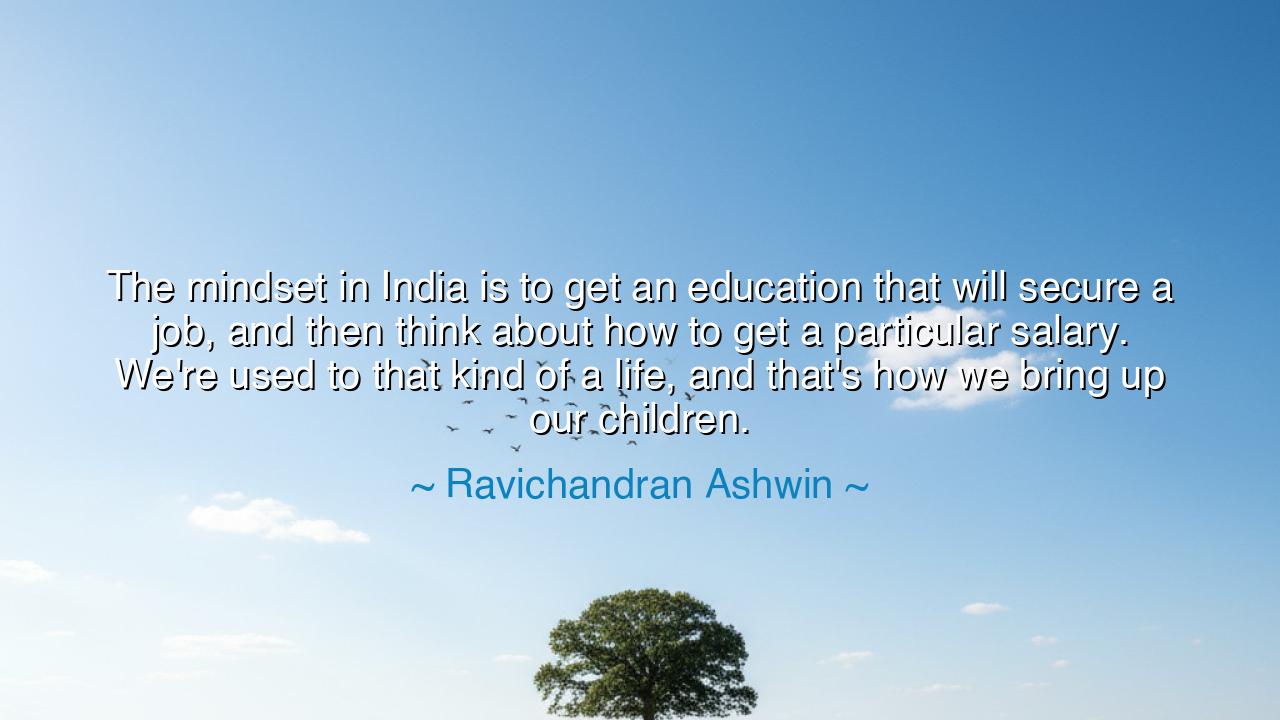
The mindset in India is to get an education that will secure a
The mindset in India is to get an education that will secure a job, and then think about how to get a particular salary. We're used to that kind of a life, and that's how we bring up our children.






Ravichandran Ashwin, master of the cricketing arts and keen observer of life beyond the field, once spoke words that strike deep into the soul of a nation: “The mindset in India is to get an education that will secure a job, and then think about how to get a particular salary. We’re used to that kind of a life, and that’s how we bring up our children.” In these words, he unveils a truth familiar to countless families, not only in India but across many lands: that the pursuit of learning has been reduced, in the eyes of many, to a tool for survival, a ladder into stability, rather than a flame of curiosity or a journey of discovery.
The origin of this mindset lies in centuries of struggle, colonization, and economic hardship. In India, where poverty often shadowed generations, parents yearned to see their children secure, safe, and respected. The surest road seemed to be through education that promised steady employment—doctor, engineer, civil servant. This pattern, repeated over decades, built a culture where the goal of study was not wisdom for its own sake, but the guarantee of a job and the stability of a salary. Ashwin, himself a product of this environment, knew its weight and could speak of it with clarity.
History offers countless examples of how such a mindset shapes destinies. Consider the millions of families after India’s independence, who sacrificed everything to send their sons and daughters to schools, not so they might explore the stars or the arts, but so they might pass the examinations that opened doors to secure government posts. These children often carried not just their own ambitions, but the unfulfilled dreams of generations before them. It was a noble pursuit born of necessity, yet it often stifled the flowering of creativity and curiosity.
The deeper meaning of Ashwin’s words is not to condemn this mindset, but to awaken awareness of its limits. For when education is seen only as a path to a salary, its greater power is forgotten. True learning is the widening of the mind, the cultivation of the spirit, the unlocking of hidden talents. A society that teaches its children to study only for security risks raising generations who fear risk, who shy away from innovation, who measure their worth only by the numbers on a paycheck.
Yet, within this very culture, there are shining examples of those who broke the pattern. Think of Dr. A.P.J. Abdul Kalam, born into poverty, who pursued science not only for livelihood but for the love of discovery, and who rose to become the “Missile Man of India” and later the beloved President. Or recall the countless entrepreneurs of modern India who stepped away from the beaten path of “safe jobs” to build new companies, new technologies, and new opportunities for millions. Their lives testify that education can indeed be more than a shield—it can be a sword of innovation, carving new futures.
The lesson for us is both tender and urgent. Parents must remember that while securing their children’s lives is noble, they must also nurture their curiosity, their passion, and their ability to dream beyond salaries and titles. Children must be taught not only to ask, “What job will this degree give me?” but also, “What joy does this knowledge awaken in me?” For in that joy lies the true potential of both the individual and the nation.
Practical action lies close at hand. Encourage children to pursue diverse interests, even if they do not immediately promise wealth. Celebrate creativity and innovation as much as exam results. Build systems of education that emphasize critical thinking, problem-solving, and imagination alongside professional preparation. And in your own life, never let your learning be confined to the demands of a job; let it instead be the companion of your soul, a force that makes you grow beyond the boundaries of necessity.
Thus Ravichandran Ashwin’s words stand as a mirror and a call. The mindset of seeking security through education has given strength to millions, but now the time has come to expand its vision. Let us raise our children not only to survive, but to create, to innovate, and to dream. For when education is both shield and flame, it does not merely lead to a salary—it leads to the birth of a brighter world.






AAdministratorAdministrator
Welcome, honored guests. Please leave a comment, we will respond soon